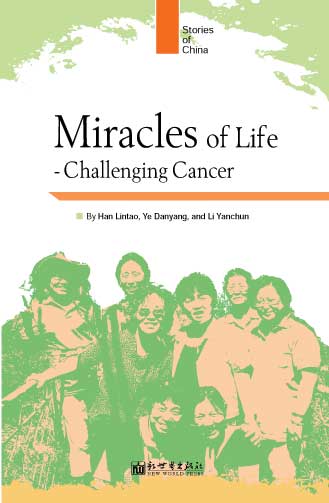
Excerpt 1| Excerpt 2| Excerpt 3| Excerpt 4
Authors: Han Lintao, Ye Danyang and Li Yanchun
Language: English
Publisher: New World Press (2008)
Price: 19.80 yuan
ISBN: 978-7-80228-842-3
Cancer poses great threats to human health and life. Cancer and cardiovascular disease have become the top two health hazards worldwide, and remain two major medical challenges. Of the world's 5.2 billion people, 7 million are affected by cancer, and over 5 million people die of cancer each year. Almost one cancer patient dies every six seconds.
According to the Third Nationwide Retrospective Survey on Causes of Death at the end of April 2008, the cancer mortality rate of urban and rural residents in China had increased by over 80 percent over the past three decades. At present, one out of four to five deaths in China are from cancer. Nearly two million people are killed by cancer each year in China.
Lung cancer ranks highest among urban residents in China, followed by liver cancer, gastric cancer, colorectal cancer and esophageal cancer; liver cancer ranks first among rural residents, followed by lung cancer, gastric cancer, esophageal cancer and colorectal cancer.
Cancer treatment also inflicts heavy financial burdens. According to statistics, the total annual medical expenses for cancer patients in China have reached about 80 billion yuan ($12 billion), accounting for 20 percent of total health expenditure, far higher than that of other chronic medical costs. Cancer is becoming one of the biggest health problems in China.
Speaking about the increasingly high incidence of cancer in China, Hao Xishan, chairman of the Chinese Anti-Cancer Association (CACA), and director of Specialty Committee of Oncology of the Chinese Medical Association, says that, while China has enjoyed rapid development in its economy, society, environment and lifestyles, with people's living standards greatly improved, these swift changes have also engendered problems including an ageing population, reduced physical activity, greater obesity and increasingly westernized dietary patterns, leading to changes in the cancer spectrum. The gradual decrease of gastric and esophageal cancers, for instance, is attributed to more varied food and improved sanitary conditions. In contrast, the incidence of colorectal cancer is increasing due to a more westernized diet.
Chinese people, however, have never slackened their efforts in fighting cancer. Just as increasing cancer and mortality rates were finally controlled in the USA in 2000, and the five-year survival rate of all cancers there increased significantly, to 60 percent now, as against 38 percent in 1963. Thanks to extensive cancer prevention measures in China as well, the incidences of cervical cancer, testicular cancer and leukemia have decreased. The incidence of liver cancer has also begun to decline after the use of hepatitis vaccines and the control of hepatitis B.
At present, we are still far away from conquering cancer through science. According to related international experience, prevention is a fundamental way to control the spread of the disease. Today, China's public health policies are experiencing some positive changes. Planning Guidelines for Cancer Prevention and Control in China (2004-2010) promulgated by the Ministry of Health at the end of 2003, identified clearly the principles of prevention first and focus on rural areas. The Ministry of Health launched an early-diagnosis-early-treatment project under central transfer payments from 2005, with one pilot area available to each province in 2008. Furthermore, the National Cancer Center affiliated to the Cancer Institute and Hospital and the Chinese Academy of Medical Sciences, has been approved by the State Council, and is to be set up shortly. From the international experiences garnered, the National Cancer Institute or the National Cancer Center should play a leading role in the country's cancer-control efforts.
The National Cancer Center to be established will focus on cancer research, prevention and treatment, states Professor Zhao Ping, director of the Cancer Hospital (Cancer Institute), of the Chinese Academy of Medical Sciences.
However, each cancer patient still faces the question: what should he or she do if stricken by cancer. Wait pessimistically and desperately for death to knock on the door, or face reality squarely and fight against the cancer with great courage?
During the anti-cancer battle, in addition to the treatment plan from the medical establishment and medical staff, great perseverance from each cancer patient greatly helps in cancer treatment. Many cancer patients, though sentenced to death by doctors, instead of falling into depression, support and encourage each other, and join in the efforts to fight against cancer in an unremitting way.
This book aims to introduce some cancer fighters, who share with us their experiences struggling against cancer, and how they have fought cancer with a smile.
(China.org.cn December 5, 2008)